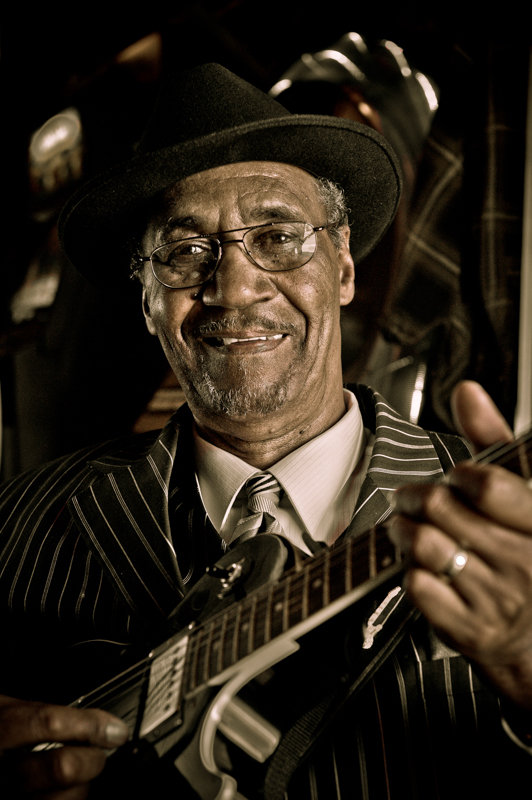ALABAMA SLIM
Alabama Slim Electric Blues
BIOGRAPHY
“I grew up listening to the old blues since I was a child. I spent summers with my grandparents who had a farm. Them old folks would get to moanin’ while they worked, and I just started moanin’ with them. That’s where I learned to sing.” – Alabama Slim Slim grew up playing in juke joints in Alabama and moved to New Orleans in the ‘60s. Since joining MM, his music has been felt at performances in the States and abroad and he has recorded The Mighty Flood, an album featuring Slim & blues guitarist Little Freddie King.
Rock with Me
- Someday Baby
Alabama Slim - guitar, vocals
Albert White - guitar, vocals
Eddie Tigner - piano, vocals
Nashid Abdul - bass
Ardie Dean - drums
42. Internationale Jazzwoche Burghausen, Germany, 2011
! ! ! please pay attention ! ! !
I Do Not Own The Rights To The Music.
All Rights Belong To Their Respectful Owners.
If you think it is violates your copyright and you wish the video to be removed immediately, please report...
HOW WE HELPED:
Alabama Slim became a Music Maker artist in 2004. Music Maker has helped him obtain a passport, provided him with sustenance grants, and assisted him in relocating back to New Orleans after Katrina. Additionally, the foundation has issued Slim’s two records, Blue & Lonesome and The Mighty Flood and featured him in the films Toot Blues and Redemption Road. Music Maker has helped Slim arrange performances throughout the United States, including at the Lincoln Center in New York, and gave him the chance to tour multiple locations across Europe playing with the Music Maker Blues Revue.
Alabama Slim was born Milton Frazier in Vance, Alabama on March 29, 1939. His father worked building trains at the Pullm an plant and his mother did domestic work. In their home, they had a Victrola and a boxful of 78s – this is where Slim fell in love with the Blues of Bill Broonzy and Lightnin’ Hopkins.
“I grew up listening to the old blues since I was a child. I spent summers with my grandparents who had a farm. Them old folks would get to moanin’ while they worked, and I just started moanin’ with them. That’s where I learned to sing. When I got grown I formed a band and we played little juke joints in the 50s and 60s. In ‘65, I came to New Orleans after hurricane Betsy. Got me a job with a moving company and then one making cooking oil. My cousin Freddie King was drinking hard in those days, and I was too. We jammed every once in awhile. By the time the 80s rolled around I was not doing much but Freddie always checked on me. By the 90s I got myself together and we have been the best of friends ever since, tighter than brothers really; there is not a day that goes by when we do not speak or see each other.” – Alabama Slim
When MMRF founder Tim Duffy, first met Slim, he recalled, “I met Alabama Slim in New Orleans while visiting bluesman Little Freddie King. Slim is a towering man, close to seven feet tall. He was very well spoken and dressed in an impeccable tailored suit. He told me he was an old friend of Freddie’s and was originally from Huntsville, Alabama. I told him if he ever got back there soon, that he should call me and I will get him into a great recording studio up there.”
New Orleans drummer Wacko Wade introduced Music Maker to New Orleans Blues guitar patriarch Little Freddie King in the late 90s and he and Freddie and Alabama have since been performing with Music Maker. Upon losing all of their possession in the floodwater of Hurricane Katrina, Alabama and Freddie settled in Dallas, TX in an apartment complex and spent most of their days working up old and new songs. Soon after, they visited producer/drummer Ardie Dean and recorded a session. Impressed by Slim’s voice and Freddie’s guitar work that danced and followed Slim wherever he went, Tim Duffy asked the two to come to NC to record. Slim and Freddie visited Music Maker that December and between fellow New Orleans musicians Slewfoot and Carrie B., they cut The Mighty Flood.
“Who knows how many incredible unrecorded blues artists are out there. It is clear that the blues will never die within the community from which it was born, as there are artists that embrace the older musical traditions and are determined to scuffle and hold dear to their Blues even if it takes them 50 years to get into a studio.”
– Tim Duffy In MUSIC MAKER !





Comments